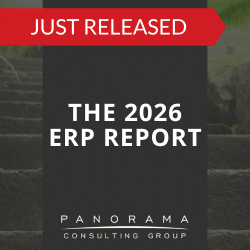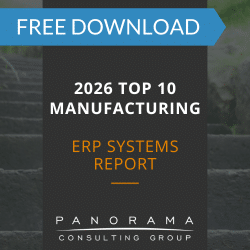What is an add-on module in an ERP system? In short, it is a software component that provides additional capabilities that expand and integrate with the base package offered by your ERP vendor. Sometimes, organizations select add-on modules from different vendors, which is considered a best-of-breed approach.
Whether you’re just starting ERP selection, or you already have a system in place, you can incorporate add-on modules to enhance the system as needed.
Today, we’re providing an overview of how add-on modules work and sharing their benefits and practical applications.
What is an Add-on Module in ERP and Why Should You Consider Implementing Them?
Most ERP software accounts for a variety of different modules. Each module represents a specific business function in an organization. A few of the most common ones include:
- Sales and marketing (CRM)
- Financial management
- Supply chain management
- Inventory management
- Human resources management
If your company is considering an ERP implementation, there likely are certain organizational goals you want to achieve. For instance, you might want to:
- Streamline current processes
- Improve outdated workflows
- Manage business growth
- Optimize productivity
- Reduce costs
Because of the modular nature of most ERP systems, you can select only the features that help you meet your specific goals.
The 2026 Top 10 ERP Systems Report
What vendors are you considering for your ERP implementation? This list is a helpful starting point.
3 Benefits of ERP Add-on Modules
1. Scaling for Growth Overtime
Add-on ERP modules allow smaller organizations to implement functionality over time to save money and resources. This allows these organizations to grow into their ERP system as their organization scales for growth instead of implementing all functionality at once.
With this approach, you’re only paying for the features you need, and skipping all the extras you don’t need at the time. This means you don’t have to implement redundant functionality.
2. Implementing Advanced Functionality
Sometimes, there might be a mission-critical part of your business that basic ERP modules simply aren’t built to support.
Say, for example, you want to grow your social media presence. In this case, you would need a system with powerful networking tools that enables you to easily create, schedule and share updates. You’d also need the ability to track comments and monitor trending topics.
While an out-of-the-box ERP system may interface and link to major social platforms, many ERP systems are not equipped to handle more advanced marketing functionality on their own.
3. Extending the Life of Your Investment
While modern ERP systems are being built to be more future-proof, many solutions still have a lifespan of around 10 years. By then, it’s expected that your company will have grown beyond the capabilities provided by the out-of-the-box system, or the technology itself will have become outdated.
Is your system nearing the end of this timeline? If it’s not financially feasible to completely overhaul your existing setup, purchasing add-on modules may be a viable alternative.
For example, if your business has grown from a local company to a multi-state or even international entity, your existing system might not have the functionality you need. Years ago, state-by-state sales tax rules might not have mattered, but they do now. Instead of paying for a brand-new system that can automate this process, you can add on a module that will do the legwork for you.
5 Common ERP Add-on Modules
When you need add-on functionality, you’ll find that there are a host of options available. While some offer niche capabilities, others are more wide-reaching in nature. Let’s review a few of the most common add-ons that companies choose to integrate with their ERP systems.
1. Customer Relationship Management
Regardless of your industry, customers are your most important stakeholders. Establishing and nurturing strong relationships with them should be a chief aim of all businesses.
A CRM module can help you keep track of critical customer data, capturing valuable insights on their buying behavior, purchase history, troubleshooting requests and more. With this information readily available in a few clicks, customer service levels soar, along with satisfaction rates.
A CRM module can help your organization enjoy these benefits right within your existing ERP system. Most of these modules include robust content managers that go beyond simply capturing and recording customer contact information. They can also track the rich interaction histories of your leads, customers and prospects.
2. Financial Management
Looking to make your ERP system a little more financially-savvy? While many ERP systems include financial management tools in their base offerings, some organizations may require a more advanced approach.
A financial management module can perform complex, real-time calculations beyond basic accounting. For instance, many can calculate revenue the second that it’s earned, using up-to-the-minute sales data. With these insights, you can better manage how money moves into and out of your company.
3. Supply Chain Management
Warehouses are filled with many moving pieces and keeping track of it all can be a nearly impossible feat. This is one of the reasons why it can be helpful to integrate a supply chain management (SCM) module with the rest of your ERP system.
Similar to what you’d find in standalone SCM systems, these modules capture real-time data to enable informed decision-making. With this new level of visibility, you can easily identify and correct disruptions at any point in your production or distribution process. You’re also better positioned to plan for future demand thanks to detailed planning and forecasting tools.
4. Inventory Management
Even if you choose not to install an SCM module, you could still benefit from implementing a module designed specifically for inventory management. This is a slimmed-down version of a more encompassing SCM tool, and it focuses on the flow of goods into and out of your warehouse.
Not only are real-time stock numbers critical for order fulfillment, they also allow you to optimize warehouse spacing and layouts to make room for new inventory.
A few of the top functions to look for in any inventory management module include:
- Stock level tracking
- Multi-location capability
- Inventory receipt processing
You’re most likely to see these features in a separate module, rather than packaged into a base ERP system. Implementing them is worth the added cost, however, as stronger inventory management can lead to:
- Competitive advantage
- Increase in profit margins
- Greater efficiency
- Higher customer satisfaction
5. Human Resources Management
Your HR department affects your entire organization and impacts every employee. That said, your HR module or HCM module must be capable of collecting large amounts of data across every department. It also must contain powerful data cleansing capabilities to ensure the information is accurate and devoid of duplicate or incorrect entries.
When it’s time to share and report on these insights, an integrated module makes this task much easier than manual extraction. This is especially the case when two departments must communicate with one another.
For instance, consider sales leaders who get bonuses based on the number of leads they convert. Your HR team will need those conversion records, which would be accessible in a CRM module. If those add-ons didn’t exist, you’d be required to count each conversion by hand, which is a time-consuming and error-prone method.
Finding the Right Add-on ERP Modules
A quick Google search will reveal that there are many different add-on modules available for various ERP systems. As you explore the options, keep in mind that only a select number will be well-suited for your business.
What is an add-on module in ERP? In short, it’s an extended capability that helps you squeeze more value out of your technology investment.
When you purchase just the basic ERP modules, you set a solid foundation. However, as time goes by and your company grows, you can add more advanced modules to help you scale.
Which add-on modules are right for you? We can help you navigate this important decision and many others. Contact our ERP consultants below for a free consultation.













